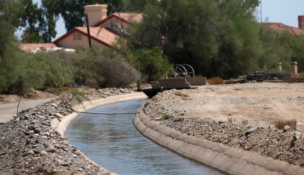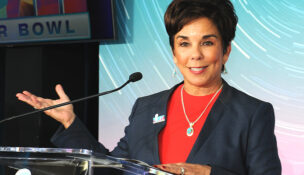Bill aims to help disabled students locate learning tools they need
Arizona Capitol Reports Staff//March 28, 2008//[read_meter]
Bill aims to help disabled students locate learning tools they need
Arizona Capitol Reports Staff//March 28, 2008//[read_meter]
Cradling a phone to his ear, insurance agent Dan Bailey asks a prospective client a series of background questions, briskly typing the answers.
No words appear on a screen; instead, the information becomes raised impressions on paper. When he dials the phone, it talks to him, repeating numbers and giving him reminders.
Dan Bailey is blind. He conducts business on a Braille typewriter, a special phone and a computer keyboard that calls out letters as he types and even provides an audio joke of the day when he hits a function key.
Bailey, 51, developed optic nerve atrophy when he was in college and went completely blind four years later, but that didn’t stop him from earning a mechanical engineering degree from Arizona State University and starting his own insurance agency.
While his college classes were difficult to get through because of his vision problems, Bailey said he could not have done it without help of the audio and Braille textbooks.
“I never would have gotten through college without this stuff,” Bailey said.
If a state lawmaker has his way, disabled students will have easier access to large-print, audio and Braille textbooks.
H2441, sponsored by Rep. Andrew Tobin, R-Paulden, would require the State Board of Education to designate a list of alternative media producers to produce audio, large-print and Braille textbooks.
Tobin said it’s difficult for teachers, students and parents to locate materials for disabled students because there is no comprehensive list.
“We want to give them access,” Tobin said. “It is difficult for them to get a one-stop shop to get the resources they need.”
Tobin said that a comprehensive list is particularly important for rural districts.
“A lot of smaller school districts don’t have these students with special needs, and when they do they don’t know where to go to get the things they need,” he said.
Tobin’s bill moved through the House without opposition and was awaiting committee action in the Senate.
Alexander “Sandy” Dominick, development director for the Arizona branch of Recording for the Blind & Dyslexic, a nonprofit organization that records readings of textbooks and other literature for students around the country, said the list would make teaching disabled children easier.
“Teachers don’t know what to use, and this way they can just call and get the list and know what materials they need for their students,” Dominick said. “It’s important that students get the education they have a right to.”
Bailey, who is on the board of Dominick’s organization, said a list would give disabled students access to a wider variety of education materials.
“Right now, it’s just dumb luck that you’re going to get something that works for you,” Bailey said. “It’s essential that kids have options. Lots of schools don’t even know that these things exist for kids.”
Carrie Schaffer, who grew up blind and used materials produced by Recording for the Blind & Dyslexic, said the list Tobin wants to create may be even more important for students with dyslexia.
“Many kids may not know that they have dyslexia, and for a long time they think they’re stupid,” Schaffer said. “Then they find out what it is and then they say, ‘OK, so where do I go now?’”
Tom Horne, Arizona’s superintendent of public instruction, said complying with Tobin’s legislation wouldn’t be a problem because the state Department of Education already maintains such lists. “It’s nice that the Legislature is concerned about these alternate materials because we think it’s important,” Horne said.
Web Link: Recording for the Blind & Dyslexic: http://www.rfbd.org/AZ/?
















